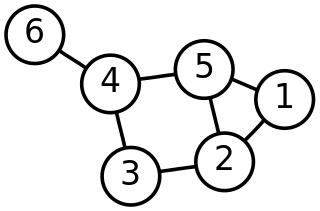Related Research Articles

Discrete mathematics is the study of mathematical structures that can be considered "discrete" rather than "continuous". Objects studied in discrete mathematics include integers, graphs, and statements in logic. By contrast, discrete mathematics excludes topics in "continuous mathematics" such as real numbers, calculus or Euclidean geometry. Discrete objects can often be enumerated by integers; more formally, discrete mathematics has been characterized as the branch of mathematics dealing with countable sets. However, there is no exact definition of the term "discrete mathematics".
A computer algebra system (CAS) or symbolic algebra system (SAS) is any mathematical software with the ability to manipulate mathematical expressions in a way similar to the traditional manual computations of mathematicians and scientists. The development of the computer algebra systems in the second half of the 20th century is part of the discipline of "computer algebra" or "symbolic computation", which has spurred work in algorithms over mathematical objects such as polynomials.

Calyampudi Radhakrishna Rao was an Indian-American mathematician and statistician. He was professor emeritus at Pennsylvania State University and Research Professor at the University at Buffalo. Rao was honoured by numerous colloquia, honorary degrees, and festschrifts and was awarded the US National Medal of Science in 2002. The American Statistical Association has described him as "a living legend” whose work has influenced not just statistics, but has had far reaching implications for fields as varied as economics, genetics, anthropology, geology, national planning, demography, biometry, and medicine." The Times of India listed Rao as one of the top 10 Indian scientists of all time.
Stephen Elliott Fienberg was a professor emeritus in the Department of Statistics, the Machine Learning Department, Heinz College, and Cylab at Carnegie Mellon University. Fienberg was the founding co-editor of the Annual Review of Statistics and Its Application and of the Journal of Privacy and Confidentiality.

Daihachiro Sato was a Japanese mathematician who was awarded the Lester R. Ford Award in 1976 for his work in number theory, specifically on his work in the Diophantine representation of prime numbers. His doctoral supervisor at the University of California, Los Angeles was Ernst G. Straus.

Louis Hirsch Kauffman is an American mathematician, mathematical physicist, and professor of mathematics in the Department of Mathematics, Statistics, and Computer Science at the University of Illinois at Chicago. He does research in topology, knot theory, topological quantum field theory, quantum information theory, and diagrammatic and categorical mathematics. He is best known for the introduction and development of the bracket polynomial and the Kauffman polynomial.

Bernd Sturmfels is a Professor of Mathematics and Computer Science at the University of California, Berkeley and is a director of the Max Planck Institute for Mathematics in the Sciences in Leipzig since 2017.
Jia Rongqing is a Canadian mathematician of Chinese origin who is a mathematics professor at the University of Alberta researching approximation theory and wavelet analysis.
Samuel Karlin was an American mathematician at Stanford University in the late 20th century.
Edward Bruce Burger is an American mathematician and President Emeritus of Southwestern University in Georgetown, Texas. Previously, he was the Francis Christopher Oakley Third Century Professor of Mathematics at Williams College, and the Robert Foster Cherry Professor for Great Teaching at Baylor University. He also had been named to a single-year-appointment as vice provost of strategic educational initiatives at Baylor University in February 2011. He currently serves as the president and CEO of St. David's Foundation.
Mark Richard Jerrum is a British computer scientist and computational theorist.
Harold Mortimer Edwards, Jr. was an American mathematician working in number theory, algebra, and the history and philosophy of mathematics.

Ingram Olkin was a professor emeritus and chair of statistics and education at Stanford University and the Stanford Graduate School of Education. He is known for developing statistical analysis for evaluating policies, particularly in education, and for his contributions to meta-analysis, statistics education, multivariate analysis, and majorization theory.

Gábor J. Székely is a Hungarian-American statistician/mathematician best known for introducing energy statistics (E-statistics). Examples include: the distance correlation, which is a bona fide dependence measure, equals zero exactly when the variables are independent; the distance skewness, which equals zero exactly when the probability distribution is diagonally symmetric; the E-statistic for normality test; and the E-statistic for clustering.
Probal Chaudhuri is an Indian statistician. He is a professor of theoretical statistics and mathematics in the Indian Statistical Institute, Kolkata.
Edward R. Scheinerman is an American mathematician, working in graph theory and order theory. He is a professor of applied mathematics, statistics, and computer science at Johns Hopkins University. His contributions to mathematics include Scheinerman's conjecture, now proven, stating that every planar graph may be represented as an intersection graph of line segments.
Jerome Harold Friedman is an American statistician, consultant and Professor of Statistics at Stanford University, known for his contributions in the field of statistics and data mining.
Graham Robert Everest was a British mathematician working on arithmetic dynamics and recursive equations in number theory.
Mir Maswood Ali was a Canadian statistician and mathematician of Bengali origin. He is known for co-discovering the Ali-Mikhail-Haq copula, which is a topic of active research, both in theory and application. Ali played a key role in establishing the Journal of Statistical Research, of which the first issue appeared in 1970. The December 2008 issue of the Journal of Statistical Research was dedicated in honor of Ali. In 2008, Ali received the Qazi Motahar Husain Gold Medal Award in recognition of his contributions to statistics.
References
- 1 2 Education and Professional Experience [ permanent dead link ] from Wiens' web site at Alberta, retrieved 2010-02-07.
- ↑ Jones, James P.; Sato, Daihachiro; Wada, Hideo; Wiens, Douglas (1976), "Diophantine representation of the set of prime numbers", American Mathematical Monthly , 83 (6): 449–464, doi:10.2307/2318339, JSTOR 2318339, archived from the original on 2012-02-24.
- ↑ The Mathematical Association of America's The Lester R. Ford Award Archived 2009-01-30 at the Wayback Machine , retrieved 2010-02-07.
- ↑ Douglas Paul Wiens at the Mathematics Genealogy Project.
- ↑ CJS editorial board, retrieved 2010-01-07.
- ↑ 2003 Annual Meeting in Halifax Archived 2009-12-06 at the Wayback Machine , SSC, retrieved 2010-01-07.
- ↑ The Canadian Journal of Statistics Award, retrieved 2010-01-07.
- ↑ ASA Fellows Archived 2020-04-09 at the Wayback Machine , retrieved 2010-01-07.